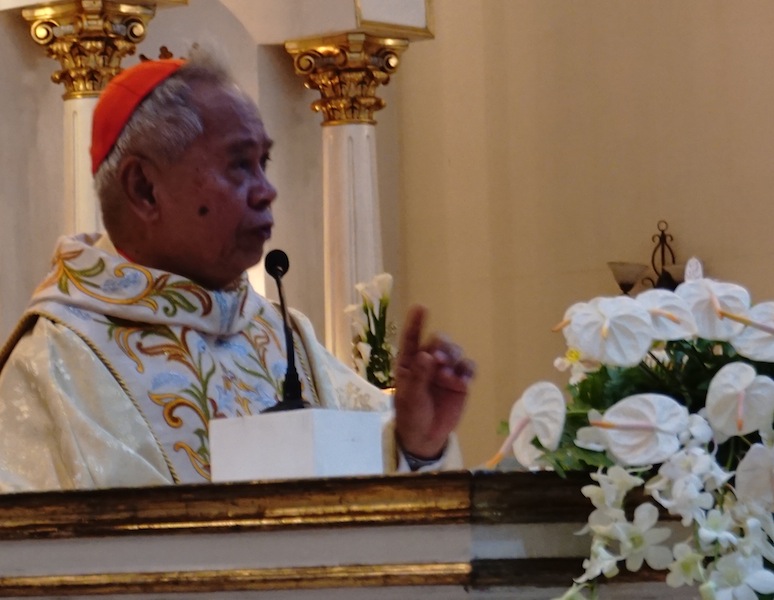KORONADAL CITY (MindaNews / 24 January) – Mindanao’s lone Cardinal, Orlando Quevedo, OMI, has joined calls for an extension of the transition period in the Bangsamoro Autonomous Region in Muslim Mindanao (BARMM) for another three years until 2025.
Quevedo, Archbishop Emeritus of Cotabato and former two-term President of the Catholic Bishops Conference of the Philippines, issued a statement “urgently and formally endorsing the petitions” to extend the Bangsamoro Transition Authority (BTA), whose mandate will expire on June 30, 2022.
 Cardinal Orlando B. Quevedo, OMI, MIndaNews file photo by GREGORIO c. BUENO
Cardinal Orlando B. Quevedo, OMI, MIndaNews file photo by GREGORIO c. BUENO
“The Bangsamoro Transition Authority will surely not be able to complete its mandate within the period of transition. The reasons are indisputable. The COVID pandemic has made it impossible for the BTA to have regular face-to-face sessions. Security issues posed by radical armed groups prevent freedom of travel for BTA officials to perform their tasks. The constraints of time are simply insurmountable,” he said in a statement on January 19.
According to Quevedo, several major issues in the fledging Bangsamoro region have yet to be resolved, among them the status of private sectarian education, the decommissioning process involving the members of the Moro Islamic Liberation Front (MILF), the setting up of the Office of Settler Communities and the demarcation of the ancestral domain of the Indigenous Peoples.
He stressed that it is not possible to establish within the allotted transition period “a new political culture within the Bangsamoro that would be ruled by the principle of transparency, accountability and efficiency – which is the professed intent of the Bangsamoro leadership.”
“(The) election in 2022 would simply erode whatever fragile gains the BTA shall have obtained within the transition period,” he said.
Quevedo joined Lanao del Sur Governor Mamintal Adiong, Jr. and local leaders in his province and at least nine towns in Maguindanao in backing calls for the extension of the transition period.
“We would like to assure the Bangsamoro government that we are one with you in the aspirations for self-determination and moral governance,” the governor said in a statement.
The BARMM turned two years old last January 21, following the ratification of Republic Act 11054 or the Organic Law for the BARMM.
The law is anchored on the Comprehensive Agreement on the Bangsamoro (CAB), the peace agreement forged by the government and the MILF after 17 years of negotiations.
Bangsamoro interim Chief Ministers Ahod Ebrahim, who is also MILF chair, said the autonomous regional is “not an end, but a continuation of the Bangsamoro struggle.”
He noted that the establishment of the BARMM “is a product of the sacrifices and pains of the mujahedeens and communities for the sake of the struggle.”
“It is important to constantly remind ourselves that what we achieved so far is founded on the blood, sweat, and tears of our brethren, our mujahedeens,” Ebrahim stressed.
Ebrahim earlier backed the extension of the transition period, which was among the recommendations of the rapid midterm review conducted by the peace advocacy group Mindanao Peoples Caucus.
The transition period is too short to implement the provisions of the CAB, including the normalization track that involves the transformation of MILF members into productive members of mainstream society, he said.
President Rodrigo Duterte expressed support for the extension of the transition period in the Bangsamoro region.
In November, the BTA passed a resolution urging Congress to extend the Bangsamoro transition period from year 2022 to 2025.
To date, at least five bills supporting BTA’s resolution have been filed in Congress. The authors are Deputy Speaker Loren Legarda, Maguindanao Rep. Esmael Mangudadatu, Lanao del Norte Rep. Mohamad Khalid Dimaporo, House Majority Leader Ferdinand Martin Romualdez, and Deputy Speaker Isidro Ungab of Davao City.
The Cotabato City-based Christian for Peace Movement (CFPM) also joined the calls for an extension, noting that “building the foundations for an inclusive and accountable autonomous government cannot be done in just three years.”
In a statement, CFPM pointed out that “there are still substantial deliverables that need to be accomplished in the normalization track of the CAB such as decommissioning, camp transformation, and transitional justice and reconciliation.”
Governor Sakur Tan of Sulu is among those opposing the moves to extend the transition period. Sulu voted against inclusion in the BARMM but is part of BARMM since RA 11054 provides that the then Autonomous Region in Muslim Mindanao vote as one geographical unit.
Basilan Rep. Mujiv Hataman, ARMM Governor from December 2011 to February 2019, last week renewed his call for an “exhaustive mid-term review” of the BARMM transition period before discussing extension.
Hataman claimed he is not against extension but wants a roadmap of what the Bangsamoro government intends to do during the extended period. (Bong S. Sarmiento / MindaNews)
